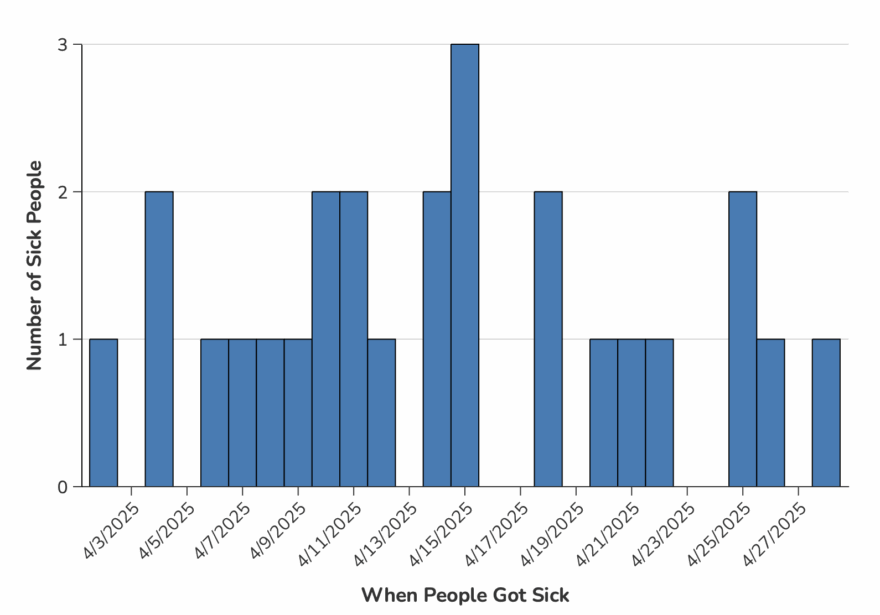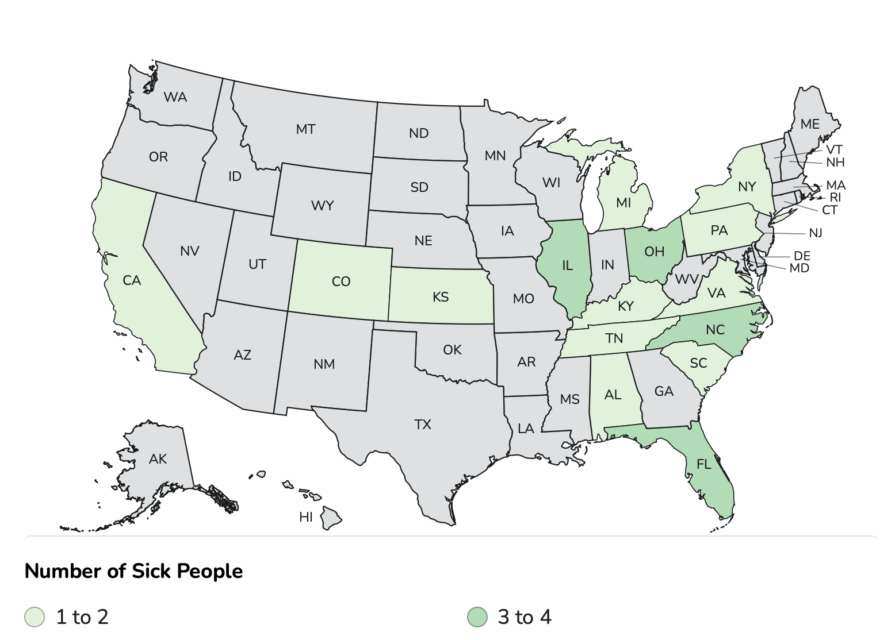Marler Clark represents a victim that was sickened in this cucumber outbreak.
As of May 19, 2025, a total of 26 people infected with the outbreak strain of Salmonella have been reported from 15 states. Seven sick people reported taking a cruise during the seven days prior to becoming sick, all departing from locations in Florida. Sick people were aboard 5 different cruise ships that departed the United States between March 30 and April 12. Illnesses started on dates ranging from April 2, 2025, to April 28, 2025. Of 23 people with information available, 9 have been hospitalized and no deaths have been reported.

State and local public health officials are interviewing people about the foods they ate in the week before they got sick. Of the 13 people interviewed so far, 11 (85%) reported eating cucumbers. This percentage was significantly higher than the 50% of respondents who reported eating cucumbers in the FoodNet Population Survey—a survey that helps estimate how often people eat various foods linked to diarrheal illness. This difference suggests that people in this outbreak got sick from eating cucumbers. Sick people on cruise ships reported eating cucumbers while on board. Three people traveled on the same ship.

Public health investigators are using the PulseNet system to identify illnesses that may be part of this outbreak. CDC PulseNet manages a national database of DNA fingerprints of bacteria that cause foodborne illnesses. DNA fingerprinting is performed on bacteria using a method called whole genome sequencing (WGS). WGS showed that bacteria from sick people’s samples are closely related genetically. This suggests that people in this outbreak got sick from the same food.
People reported buying and eating cucumbers from a variety of locations including grocery stores, restaurants, hospitals and on cruise ships. FDA’s traceback investigation identified Bedner Growers Inc. as the common grower of cucumbers in this outbreak.
FDA conducted an inspection at Bedner Farms Inc. in April 2025 as a follow up to a previous outbreak. During their inspection, environmental samples were collected. An environmental sample was identified as the outbreak strain of Salmonella. CDC and FDA are concerned that contaminated cucumbers may still be within shelf life based on the timing of illnesses in this outbreak.
WGS analysis of 25 people’s samples did not predict resistance to any antibiotics. One person’s sample predicted resistance to trimethoprim. More information is available at the National Antimicrobial Resistance Monitoring System (NARMS) site. Most people with Salmonella illness recover without antibiotics. However, if antibiotics are needed, this resistance is unlikely to affect the choice of antibiotic used to treat most people.
Public health actions
CDC advises businesses to not sell or serve whole cucumbers grown by Bedner Growers Inc. and distributed by Fresh Start Produce Inc. between April 29, 2025 to May 19, 2025 while the investigation is ongoing. If you have any whole cucumbers in your home and can’t tell where they are from, throw them out.
A History of Salmonella Cucumber Outbreaks:
2013 In April 2013 the CDC and their state and local partners and the FDA, investigated an outbreak of Salmonella Saintpaul Infections linked to consumption of imported cucumbers. In total, there were 84 outbreak associated cases residing in 18 states. Among persons for whom information was available, illness onset dates ranged from January 12, 2013 to April 28, 2013. Ill persons ranged in age from less than 1 year to 89 years. Among 60 persons with available information, 17 (28%) were hospitalized. No deaths were reported. On April 24, 2013 the FDA placed Daniel Cardenas Izabal and Miracle Greenhouse of Culiacan, Mexico on Import Alert. The cucumbers were distributed by Tricar Sales, Inc. of Rio Rico, Arizona.
2014 In August 2014 public health investigators detected an increase in Salmonella Newport through surveillance of PulseNet, a national molecular subtyping network for foodborne disease. A total of 275 cases were reported from 29 states and the District of Columbia. Illness onset dates ranged from May 25 to September 29, 2014. Thirty four percent (48 of 141) were hospitalized; one death was reported in an elderly man with bacteremia. Sixty-two percent (49 of 79) of respondents reported eating cucumbers in the week before becoming ill. Officials in Maryland, Delaware and New York worked with the FDA and USDA to conduct an informational traceback from retail establishments to identify a point of distribution for produce items. Preliminary traceback led to common grower in Maryland’s Eastern Shore in the Delmarva region. Officials collected 48 environmental samples from areas where cucumbers were grown, harvested and packed. No samples yielded Salmonella although sampling was performed several months after harvest.
2015 On September 4, 2015 the CDC announced an outbreak of Salmonella Poona linked to consumption of cucumbers grown in Mexico and imported by Andrew & Williamson Fresh Produce. On March 18, 2016 the outbreak was declared to be over. A total of 907 people infected with the outbreak strains of Salmonella Poona were reported from 40 states. Among people for whom information was available, illnesses started on dates ranging from July 3, 2015 to February 29, 2016. Two hundred four ill people were hospitalized, and six deaths were reported. Salmonella infection was not considered to be a contributing factor in two of the 6 deaths. Epidemiologic, laboratory, and traceback investigations identified imported cucumbers from Mexico and distributed by Andrew & Williamson Fresh Produce as the likely source of the infections in this outbreak.
2016 In April 2016, a multistate cluster of Salmonella Oslo infections with an indistinguishable PFGE pattern was detected, involving 14 patients in 8 states. Illness onsets occurred between March 21 and April 9. Epidemiologic evidence implicated consumption of Persian cucumbers; however, Salmonella was not isolated from any cucumbers.
2018 Seven cases of Salmonella Infantis infections were associated with consumption of English cucumbers purchased at various Costco stores. Illnesses began in August 2018. The last reported illness occurred on September 15, 2018. Two people were hospitalized. No one died.
2024 In June 2024, the CDC announced a multistate outbreak of salmonellosis associated with cucumbers. As of August 22, 2024, a total of 551 cases had been reported by 34 states and the District of Columbia. Cases of Salmonella Africana (n=282) and Salmonella Braenderup (n=269) were detected. CDC and FDA combined investigations of these two serotypes as they shared several similarities, including where and when illnesses occurred, the demographics of ill people and the foods they reported eating before they became sick. Illnesses started on dates ranging from March 11, 2024 to July 26, 2024. Of 456 people with information available, 155 were hospitalized. No deaths were reported.
Of 226 people interviewed about foods they ate in the week before illness onset, 155 (69%) reported eating cucumbers. Whole genome sequencing (WGS) showed that bacteria from sick people samples were closely related.
WGS analysis of bacteria from 235 people’s samples predicted resistance to one or more of the following antibiotics: amoxicillin-clavulanic acid, ampicillin, azithromycin, cefoxitin, ceftiofur, ceftriaxone, ciprofloxacin, fosfomycin, and tetracycline.
FDA’s traceback investigation identified Bedner Growers, Inc. in Florida as a supplier of cucumbers in this outbreak. This one grower does not account for all illnesses in this outbreak. FDA collected samples at the grower in Florida and identified Salmonella Braenderup in untreated canal water. WGS determined that the Salmonella found in the water is the same strain of Salmonella Braendrup that made people sick. Additional soil and water samples collected at Bedner Growers, Inc. were positive for other strains of Salmonella.
Officials in the Pennsylvania Department of Agriculture collected samples of cucumbers from several retail locations in the state. Testing identified a different strain, Salmonella Bareilly, in one sample of these cucumbers.
2024 On May 31, 2024, Fresh Start Produce Sales, Inc. issued a recall. Cucumbers distributed by Fresh Start Produce Sales, Inc. were from a variety growers. The grower that likely supplied potentially contaminated cucumbers is no longer growing and harvesting cucumbers for the season. The cucumbers were shipped from May 17 to May 21, 2024. They were grown in Florida.
In November 2024, CDC, FDA, in collaboration with state and local partners, investigated an outbreak of SalmonellaTyphimurium infections associated with American/slicer cucumbers from SunFed Produce, LLC. A total of 113 people infected with the outbreak strain of Salmonella were reported from 23 states. Illnesses started on dates ranging from October 12, 2024, to December 7, 2024. Twenty-eight people were hospitalized. No one died.
Of the 69 people interviewed, 56 (81%) reported eating or likely eating cucumbers. CDC and states identified 7 illness sub-clusters at 3 assisted living facilities, 3 school districts and 1 restaurant.
On November 27, 2024, SunFed Produce, LLC initiated a voluntary recall of all sizes of American/slicer cucumbers that were grown by Agrotato, S.A. de C.V. in Sonora, Mexico. SunFed Produce, LLC distributed recalled products to retail and foodservice customers in AK, AZ, AR, CA, CO, CT, FL, ID, IL, IN, KS, MD, MA, MN, MO, NJ, NY, NC, OK, PA, TN, TX, UT, VA, WA, and WI. The cucumbers were sold between October 12, 2024 and November 26, 2024.
Salmonella: Marler Clark, The Food Safety Law Firm, is the nation’s leading law firm representing victims of Salmonella outbreaks. The Salmonella lawyers of Marler Clark have represented thousands of victims ofSalmonella and other foodborne illness outbreaks and have recovered over $900 million for clients. Marler Clark is the only law firm in the nation with a practice focused exclusively on foodborne illness litigation. Our Salmonella lawyers have litigated Salmonella cases stemming from outbreaks traced to a variety of foods, such as cantaloupe, tomatoes, ground turkey, salami, sprouts, cereal, peanut butter, and food served in restaurants. The law firm has brought Salmonella lawsuits against such companies as Cargill, ConAgra, Peanut Corporation of America, Sheetz, Taco Bell, Subway and Wal-Mart.
If you or a family member became ill with a Salmonella infection, including Reactive Arthritis or Irritable bowel syndrome (IBS), after consuming food and you’re interested in pursuing a legal claim, contact the Marler Clark Salmonella attorneys for a free case evaluation.